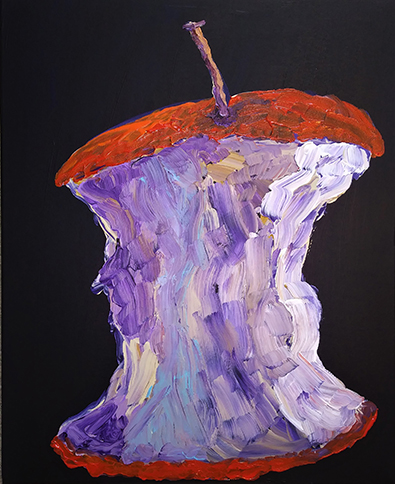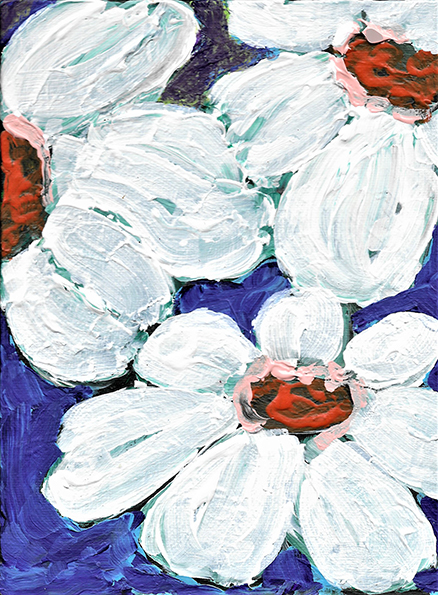David Spicer
All of My Best Friends Are Dead
Take Jenko Shodkin: he and I played
on Dempster Road as twelve-year-olds
before it gutted itself into a neighborhood
of thin, rocky trails and missing girls
buried in a back yard. We’d practice Walk
the Dog or Around the World on our dueling
yo-yos, cut our hated Catholic school to ride
bikes over the state line to Mississippi,
and stare at high school girls lipsticking
their young mouths. We joined
the Air Force together, separated
after boot camp, and then he married my
sister—the crazy one who stuck a gun
in his ear one night. He laughed.
They moved to Idaho, where he joined
a carnival and ran away with a sword
swallower. I didn’t hear from him again
until five years ago: standing on the shoulder
of Highway 61, he stuck his thumb
out and I picked him up, drove to Clarksville.
We recounted the good old bad days,
when the world was a hell of a heaven,
when the sun shined like a new silver dollar
in our outstretched hands after Old Man
Mathis slapped one each into our palms
in celebration of Larsen pitching his
perfect game. That Clarksdale day we
laughed at ourselves—how Jenko
beat the baby crap out of two bullies
nicknamed the Blond Hippos.
How he told them to scram,
and I ass-kicked both of them,
yelling, Go put on your panties,
you fat pussy moaners. Yes, Jenko
was my best friend for life, until he
didn’t have a life: a couple of weeks
ago,two big thugs broke into his trailer
as he slept, slit his neck like a box
made of flesh, and stole everything
he owned: a Randall knife,
the ‘53 Marilyn Monroe Playboy,
and a plastic bag of Clint Eastwood
and Fellini videos. Jenko loved
culture as much as I did, and now he’s
like yesterday’s wind. But I feel
his spirit like the white shirt that flaps
on his clothesline, reminding me
old friends don’t die—they just linger.
Elegy For Joan
Joan Colby, 1939-2020
Smaller than the jockeys who rode
your prize thoroughbreds, you didn’t
shovel anyone’s shit: in a workshop, you
used the word obese, and a fellow poet
called you a fat shamer. He didn’t realize
he dodged a major ass-chew
from a woman half his size.
Too gentle with this colt, you educated
him nicely about bad manners.The workshop disbanded,
but you and I remained friends:
two of a kind, we lived to write
the next poem—sonnets, narratives
with five-syllable words, sestinas—
each of us more prolific than Bukowski.
Your polished poems out-brightened mine
like a spit-shined brogan shows
a scuffed loafer its flaws just by its sheen.A Renaissance woman--wife,
mother, grandmother, union steward,
pickup truck driver, gardener, caregiver,
managing editor—you blurbed my
book with high praise. Off to the races
then, Joan: we wrote long e-mails
every day, never a harsh word.
Damn, I miss you. You told me about your
storm-crossed marriage, its money quarrels.And your two daughters—accomplished
women—chips off the old block, I thought—
your son, who advised you how to trade
your old guns for a new one. Six grandchildren,
especially the girl who resembled you
and who’d inherit your ten-thousand-book
library, plus your German Shepherd Vesta.
You wrote me, too, of your visits to the clinics
where you drove Alan for his blood treatments.Then he faltered, fell, and died. You told me
about your life with and without your husband,
wrote seventy poems: the first time
you met, his leaning down from a ladder,
winking at unimpressed you. His love for the Cubs
and the Bears. Your discussions about books
you’d miss. What do you want? he asked
one day when you’d both had enough.
I’m buying a farm, you answered. He nodded.You rejected the old adages, Joan:
You’re strong (I don’t know about that),
You’ll live another ten years (I don’t want
to without him). Your heart ached
like a sick bird’s, you didn’t want to live
but did: writing one, two, three,
four poems a day that packed punches
sixty-year marriages survive. You worked
like you knew you had little time.You didn’t stop until cancer grabbed your lungs,
and you wrote, I’ve treasured our friendship.
I treasured it, too, Joan: your strength now mine,
I think of you, know I’ll write until I drop
like a fumbled ball. Now, I imagine you, in bed,
your family around you as you talk to Alan
already on the other side. Other side of where?
you ask. No other side. World, I’ve had enough
of you. My book is done, and so am I.
David Spicer has published poems in The American Poetry Review, CircleStreet, Gargoyle, Moria, Oyster River Pages, Ploughshares, Remington Review, Santa Clara Review, The Sheepshead Review, Steam Ticket, Synaeresis, Third Wednesday, Yellow Mama, and elsewhere. Nominated for a Best of the Net three times and a Pushcart twice, he is author of six chapbooks and four full-length collections, the latest two being American Maniac (Hekate Publishing)and Confessional (Cyberwit.net). His fifth, Mad Sestina King, is forthcoming from FutureCycle Press.

